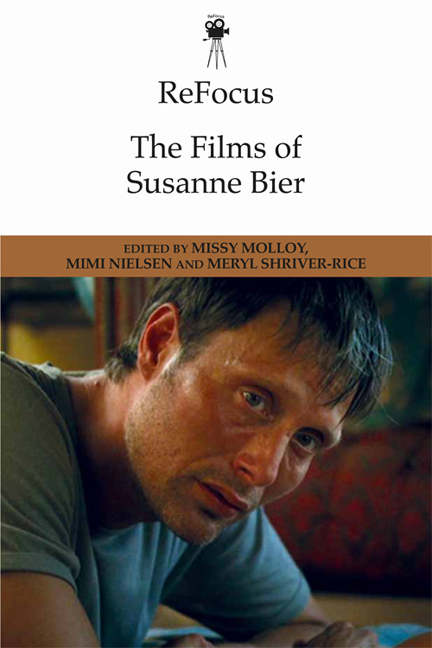Book contents
- Frontmatter
- Contents
- List of Figures
- Notes on Contributors
- Foreword
- Introduction: Susanne Bier's Boundary-Crossing Screen Authorship
- Part 1 Generic and Industrial Fluidity
- Part 2 Negotiating Identity
- Part 3 Authorship and Aesthetics
- Part 4 Transnational Reach
- Postscript: A Conversation with Susanne Bier
- Filmography of Susanne Bier
- Acknowledgments
- Index
Part 2 - Introduction
Published online by Cambridge University Press: 01 May 2021
- Frontmatter
- Contents
- List of Figures
- Notes on Contributors
- Foreword
- Introduction: Susanne Bier's Boundary-Crossing Screen Authorship
- Part 1 Generic and Industrial Fluidity
- Part 2 Negotiating Identity
- Part 3 Authorship and Aesthetics
- Part 4 Transnational Reach
- Postscript: A Conversation with Susanne Bier
- Filmography of Susanne Bier
- Acknowledgments
- Index
Summary
While Bier has been unusually attentive to marginalized social and ethnic identities on screen from the start of her film career, she often appears reluctant, in interviews, to discuss identity politics except when directly related to her Jewish heritage, which she has consistently credited as pivotal to her worldview (see for instance Hjort 2000 and Johnson 2011). Quite possibly, Bier, like other women successful in film, has been wary of stressing her exceptional status as a woman filmmaker to protect the reception of her work on its own terms. The chapters in this section stress the influence of identity on film production and reception, and collectively indicate that films are rarely, if ever, evaluated without factoring it in. The section is therefore attentive, in equal measure, to how Bier approaches identity on screen as well as to how others perceive her work in light of her off-screen persona. Thus, this collection of chapters illuminates Bier's evolving creative and paratextual responses to particular identities.
Maureen Turim's “Beginning with Jewish Survival: Freud's Leaving Home” is a close reading of the complex references to Jewish heritage in Bier's first feature-length film. Turim employs a psychological lens to assess the film’s distinct blend of comedy and tragedy, most particularly in its evocations of Freud's delayed maturation, Rosha's impending death, and their intense, ambivalent mother-daughter bond. The chapter further situates Freud’s Leaving Home in the context of contemporaneous films by Jewish directors that represent diasporic Jewish families in cultural transition.
In “Stories with Queer Identities,” Anders Marklund analyzes representations of queer characters in Bier's films Like It Never Was Before (Pensionat Oskar, 1995), Once in a Lifetime (Livet är en schlager, 2000), and Love Is All You Need (Den skaldede frisør, 2012), and in her television series The Night Manager (2016). Marklund argues that Bier's career shift from ‘modest-sized Swedish productions to larger international ones’ parallels a movement away from nuance and toward broad stereotyping in her work's approach to queer characters. He connects this shift to each film's specific context and intended audience, linking, for instance, Like It Never Was Before to Sweden's gay rights movement in the 1990s and considering The Night Manager's Corky according to the series’ function as mainstream, heteronormative entertainment. Marklund concludes that Bier's more recent and ‘elegant transnational productions’ re-marginalize queer characters in a manner reminiscent of earlier problematic film stereotypes.
- Type
- Chapter
- Information
- ReFocus: The Films of Susanne Bier , pp. 81 - 82Publisher: Edinburgh University PressPrint publication year: 2018



